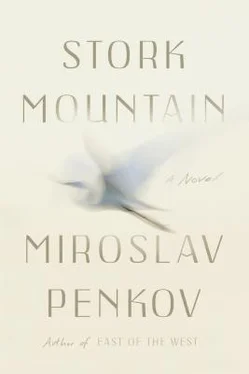Miroslav Penkov - Stork Mountain
Здесь есть возможность читать онлайн «Miroslav Penkov - Stork Mountain» весь текст электронной книги совершенно бесплатно (целиком полную версию без сокращений). В некоторых случаях можно слушать аудио, скачать через торрент в формате fb2 и присутствует краткое содержание. Год выпуска: 2016, Издательство: Farrar, Straus and Giroux, Жанр: Современная проза, на английском языке. Описание произведения, (предисловие) а так же отзывы посетителей доступны на портале библиотеки ЛибКат.
- Название:Stork Mountain
- Автор:
- Издательство:Farrar, Straus and Giroux
- Жанр:
- Год:2016
- ISBN:нет данных
- Рейтинг книги:4 / 5. Голосов: 1
-
Избранное:Добавить в избранное
- Отзывы:
-
Ваша оценка:
- 80
- 1
- 2
- 3
- 4
- 5
Stork Mountain: краткое содержание, описание и аннотация
Предлагаем к чтению аннотацию, описание, краткое содержание или предисловие (зависит от того, что написал сам автор книги «Stork Mountain»). Если вы не нашли необходимую информацию о книге — напишите в комментариях, мы постараемся отыскать её.
Stork Mountain — читать онлайн бесплатно полную книгу (весь текст) целиком
Ниже представлен текст книги, разбитый по страницам. Система сохранения места последней прочитанной страницы, позволяет с удобством читать онлайн бесплатно книгу «Stork Mountain», без необходимости каждый раз заново искать на чём Вы остановились. Поставьте закладку, и сможете в любой момент перейти на страницу, на которой закончили чтение.
Интервал:
Закладка:
There, look, see the vatafin gripping his cudgel. See how he sprints to the pit, and pole-vaults it, right through the tall flames. His body — a steel blade, which the flames harden. Fever, he’s saying, bow low before me. You can’t scorch that which fire has scorched already.
One after the other, the boys take the cudgel, run to the pit, and try to vault it. One boy falls left, one falls right, one drops straight in the fire, and when the men pull him out his bottom is flaming. They beat the flames down with their fur caps, and the girls are laughing, pointing, and clapping.
“Poor soul, he’s done for,” his cousin tells Grandpa. And they both know it — the lame son of the miller will have a better chance of getting married than the boy with the charred bottom.
“Saint Elijah,” Grandpa’s cousin prays to his name saint when it’s his turn to hold the cudgel. “Don’t let some fire shame me.” And he runs, digs the pole in the deep pit, shoots his legs forward, and lands on the other side safely, the fifth boy to do so in twenty.
One more boy left to be chosen and it’s not even Grandpa’s turn to jump yet. So each time someone new takes the cudgel Grandpa prays to Saint Elijah. “Saint Elijah, you’re not my name saint, but if you let the fire pass me through, I’ll slay my grandfather’s rooster to give you kurban . Saint Elijah, if you make sweet Sevda love me, just once if you let me kiss those thick lips, I’ll slay my grandmother’s hens and chickens, the whole coop.”
Then this boy, older, almost twenty, short like a pea but a strong fellow, he took the cudgel and leapt over the pit and through the fire and that was that. The sixth boy had been chosen.
“No,” I cried, and threw away my blanket. There was no way this ended the story.
“From where I’m standing,” Grandpa said, and nodded, “I can see the vatafin and the six boys, on the other side of the pit, through a curtain of fire. And the fire flows upward and turns their shapes to liquid. So I say, ‘Saint Elijah, you just watch me.’ And I say it out loud, so everyone hears it.”
Muddy-eyed, Grandpa sprang up to his feet. Muddy-eyed, he looked about the room. He was there, on the square, a young boy ready to leap over the fire.
“Grandpa,” I whispered, “watch out for the oil lamp.” But he didn’t hear me.
“So I dig my heels down in the ground,” he almost shouted, and stomped the floor, “and I run like a hala and I leap over the pit and the tall flames — no cudgels, no sticks, no canes needed. You just watch me, Elijah, my arms wings and my feet carts of fire. Pull me down, Elijah, if you can. If you dare — stop me!”
“The lamp, Grandpa!” And when I pulled the lamp out of his hands he blinked, suddenly sober, and all the years came rushing back.
“So they took you with the kalushari ?” I said, and threw a blanket on his shoulders.
“How could they not take me?”
“And did you give a kurban for Saint Elijah? Did you make Sevda love you and did you kiss her?”
“I gave him a kurban , my boy,” he said, and his voice fell lower.
Day after day, he gave the saint one offering after another. He slaughtered roosters and chicks, and lambs and cows even. He burned barns and houses. He was up in the woods by then, with the Communist fighters, three months after jumping the fire. And they were raiding hamlets and sheep pens, and their brains were aflame with this new fever. And only when his cousin came up to find him, only when he said “They’re burying Sevda tomorrow,” did Grandpa go back to the village. But he didn’t kiss her. They didn’t even let him open the coffin because of her sickness. And her father came to him when it was over, when the earth had been piled up black and steaming, and said, “Weren’t you with the kalushari ? Why didn’t you save her?” And Grandpa told him, “You muttonhead, that’s all opium for the masses,” and couldn’t run fast enough back to his comrades, to give Elijah another kurban , bloodier this time so the saint would remember him by it forever.
What sadness overcame me to hear this. To picture my grandfather burning barns and houses. Raiding sheep pens, stealing lambs and fleeces. A Communist fighter. A bandit. Gone was the image of Captain Kosta, of the heroic rebel.
I recalled a story Grandpa once told me when I was little. The story of how one day in the dugout he’d met a man, older than him, a schoolteacher from a nearby village. From his pocket, the man had pulled out a notebook. “You seem like a fool and fools are lucky,” the man told Grandpa. “So if I die and you live, take this to my wife and children.” Inside the book were letters, and between the letters the man had stuffed tiny petals of flowers, leaves of crane’s bill and basil. Then he picked up a lump of black earth — it was an underground dugout they hid in — and smeared the mud on the first page. “For my children,” he told Grandpa, “to see what I’ve seen.” A month later the tsarists mowed down the man, and when that September the Communists seized control of Bulgaria, Grandpa found the man’s widow and gave her the notebook. But the widow wouldn’t take it. “I have no use for words and mud and dry leaves. I want a husband and my boys want a father.” And she forced Grandpa to take two sacks of schoolbooks that had belonged to her husband.
Grandpa read the man’s letters and then his schoolbooks. Then he hitched a ride to Pleven, walked straight to the university, never you mind that the semester was already half over, and signed up to study to be a teacher. Never you mind that he lacked a proper academic background. Hadn’t he been a partisan fighter, and wasn’t this more background than anyone ever needed?
Now in the light of the oil lamp, with the babble of water rushing down hills and dirt roads, and thunder booming across the border, I could see the barns burning and my grandfather gripping the torch that had set them on fire. And I wondered, was it only the shameful stories he had never told me; and if so, was this the reason he’d never mentioned the nestinari and the tree with their skulls in its branches?
“For a whole month,” Grandpa was saying, “we had been walking from one village to another, curing the sick and chasing the Fever.”
The vatafin led them and so they followed in his footsteps, they the chosen ones, the kalushari. All day long they kept quiet, and if they spoke it was always in whispers. They didn’t make the sign of the cross and when they ate a meal they didn’t bless it. They marched in pairs, Grandpa’s cousin beside him, in a chain that no stranger could break. They were not allowed to tread water. Why? Who could tell you? If they came to a small stream, they leapt over it with their cudgels; if they reached a river, they waited for a cart to take them across it. They sent a scout, the kalauz they called him, to let each village know they were coming and to look out for other bands of kalushari . Because such was the custom — no two bands were allowed to cross paths. “And if they do?” Grandpa asked the vatafin , and the vatafin pulled out his dagger and began to sharpen it.
“If only you could’ve seen me, my boy, prouder than a rooster. My chest bursting under the white shirt.”
Every ten steps Grandpa would touch the daggers in his sash and rub their handles. He’d smack the cudgel against his thigh so the bells would ring, like beautiful girls calling him to their bedside. His blood was turning sour with desire. What did he care that people were sick and perishing? All he cared about was how the women looked at him when the vatafin led them into the house of the dying. They’d lay the sick man on a rug on the floor and gather around him, and one of the boys would blow up a bagpipe and play the rachenitsa so loudly Grandpa’s teeth needled. They’d dance in circles around the sick man, slowly at first and then faster, and they’d hold the rug by its corners and toss the man up in the air a few times. Then the vatafin would break up the circle to rub the dying man with vinegar from head to toe. How the room reeked by then! A herd of rams sweating, jumping, and dancing. Then they’d leap over the sick man three times, bellowing, bleating, and braying. Give me a woman! Grandpa would shout, but no one heard him. And what the others shouted, no one could tell you. The vatafin would place a jug by the sick man, a jug full of cold water and fresh herbs, and the bagpipe would strike a new song, the florichika , so fast and fierce Grandpa went through a new pair of sandals every two days. They danced in circles until floor merged with walls and ceiling and the vatafin commanded the oldest boy to break the jug with his cudgel. And if the sick man jumped on his feet and ran out of the room when the jug shattered, if one or two of the boys fainted, that was a good sign. They’d chased away the Fever.
Читать дальшеИнтервал:
Закладка:
Похожие книги на «Stork Mountain»
Представляем Вашему вниманию похожие книги на «Stork Mountain» списком для выбора. Мы отобрали схожую по названию и смыслу литературу в надежде предоставить читателям больше вариантов отыскать новые, интересные, ещё непрочитанные произведения.
Обсуждение, отзывы о книге «Stork Mountain» и просто собственные мнения читателей. Оставьте ваши комментарии, напишите, что Вы думаете о произведении, его смысле или главных героях. Укажите что конкретно понравилось, а что нет, и почему Вы так считаете.











